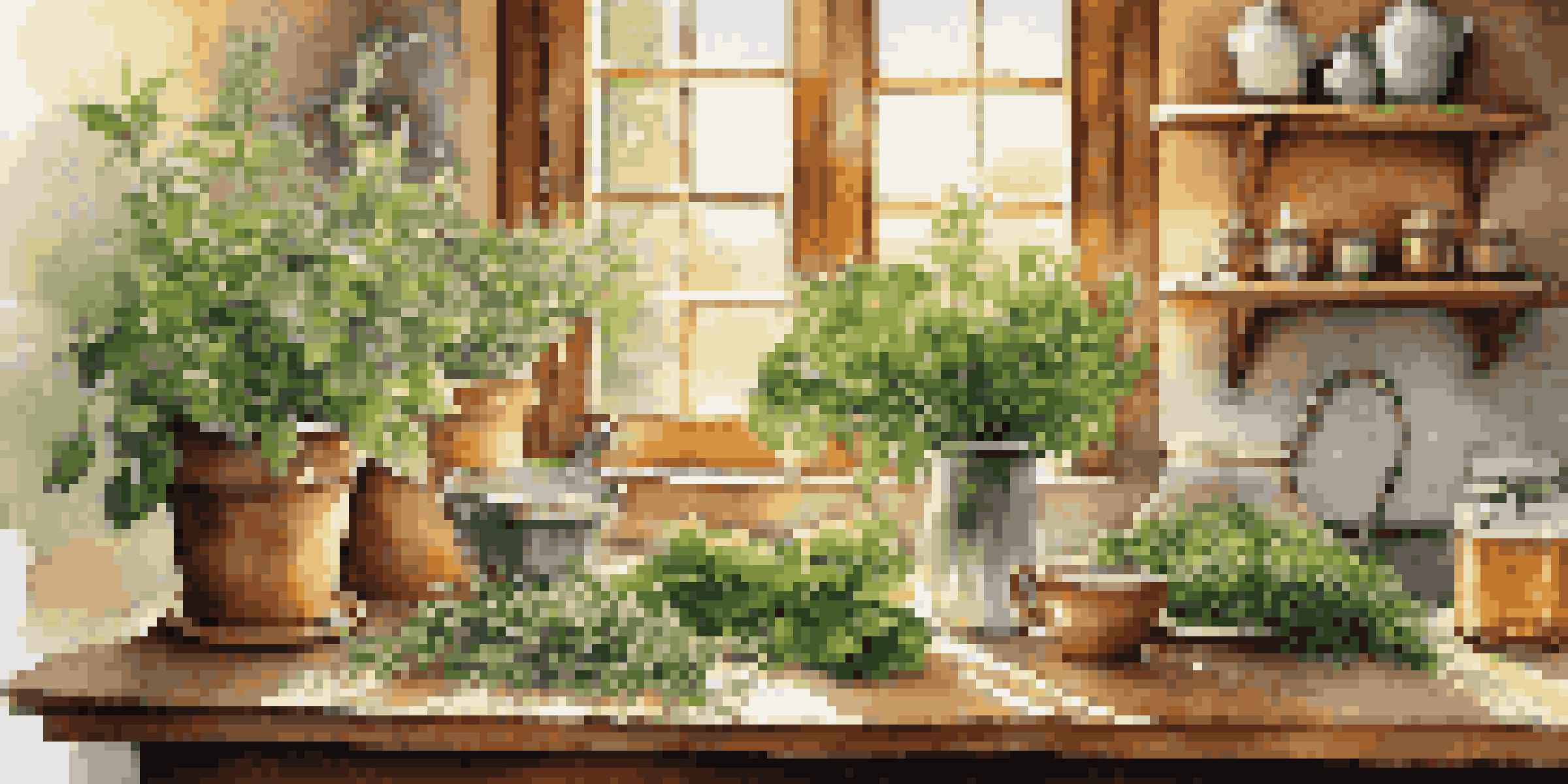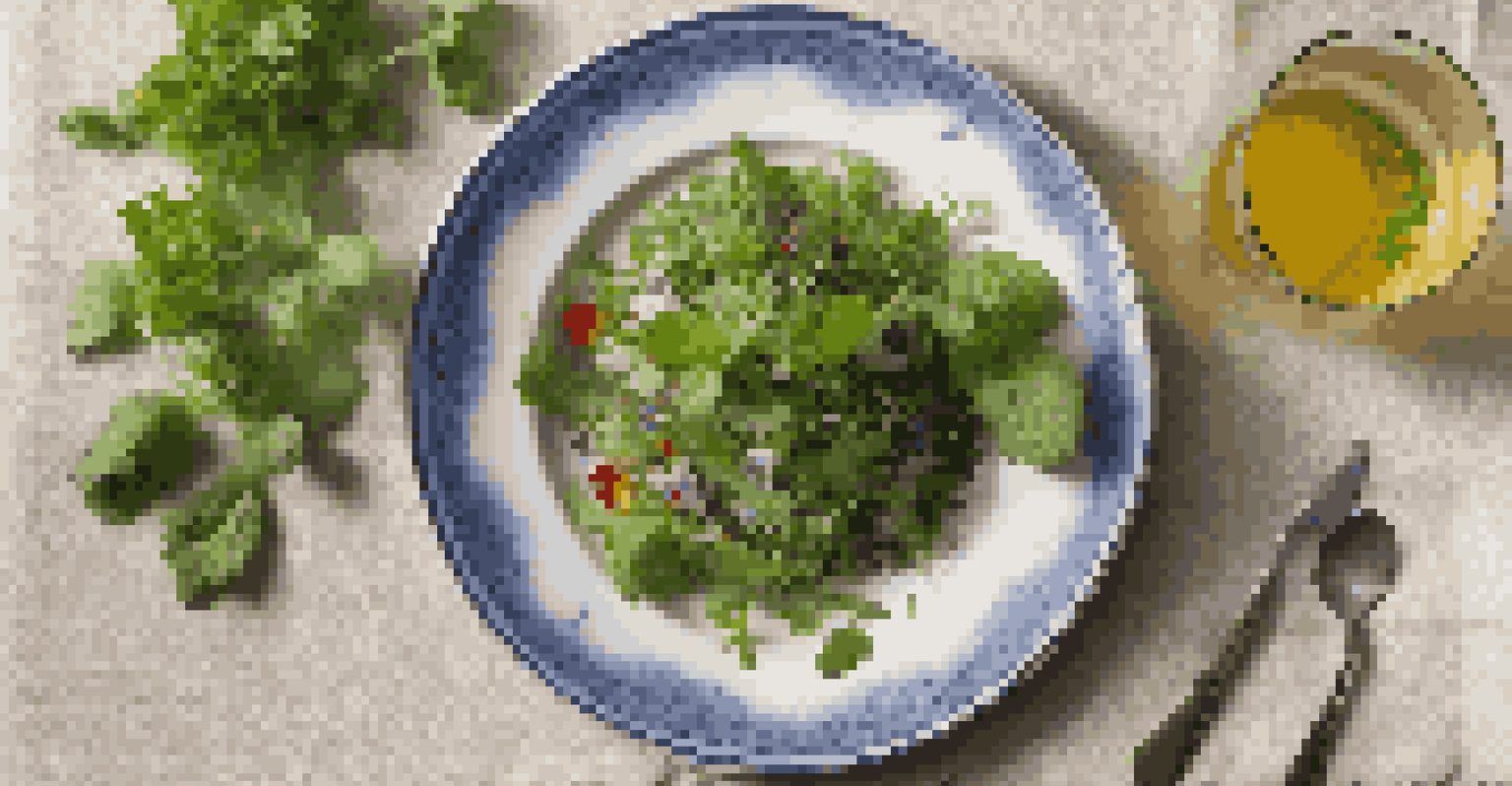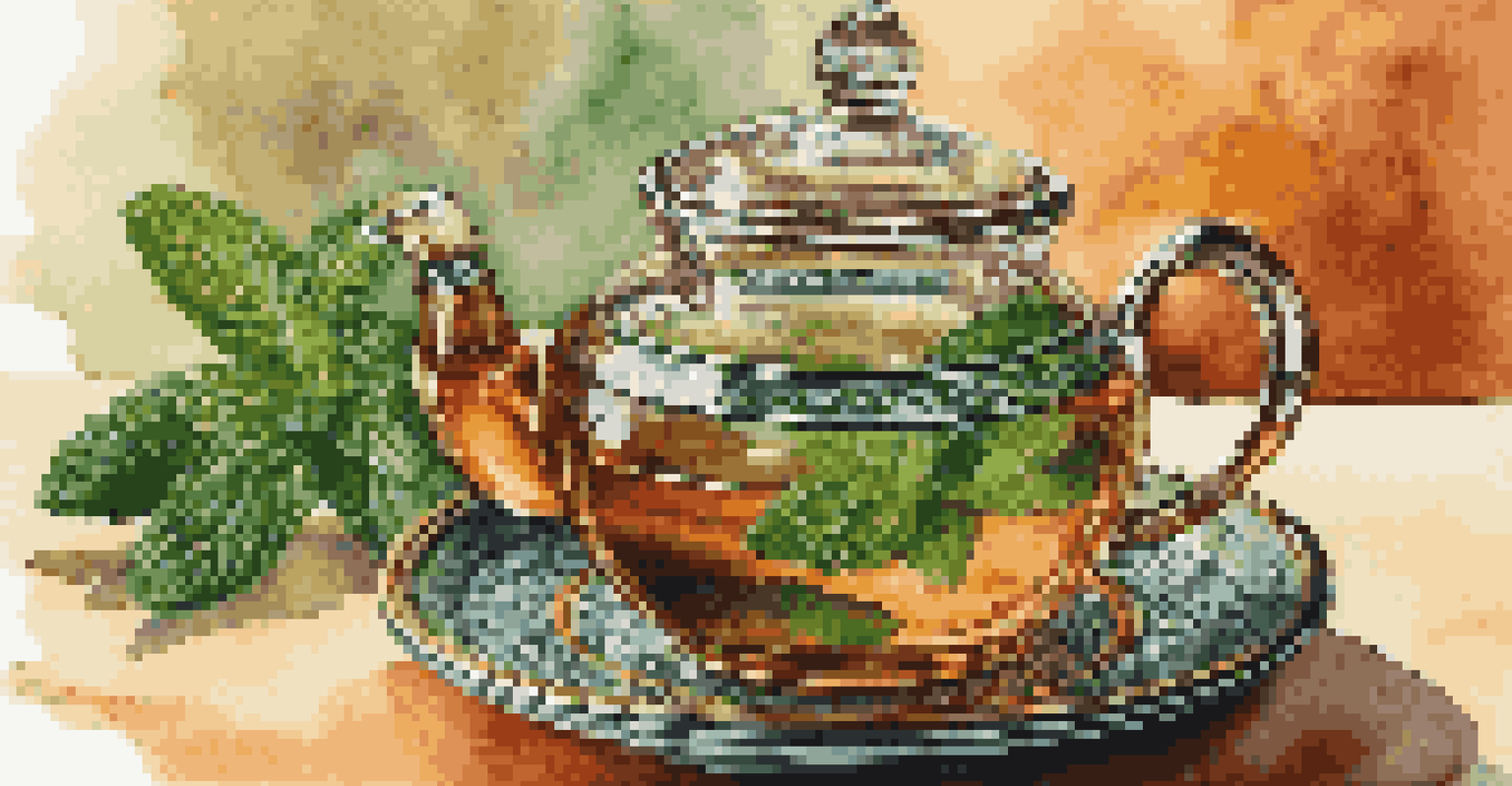Herbal Infusions: Exploring the Role of Herbs in Local Cuisine

The Essence of Herbal Infusions in Cooking
Herbal infusions play a crucial role in many culinary traditions around the world. They are made by steeping herbs in hot water, allowing their flavors and health benefits to infuse into the liquid. This practice not only adds depth to dishes but also connects us to cultural heritage and the natural environment.
Herbs are the spice of life, adding flavor, color, and nutrition to our meals.
In local cuisine, herbs can transform a simple dish into a symphony of flavors. For instance, a basic broth becomes aromatic with the addition of fresh thyme or rosemary, enhancing its appeal and complexity. This process of infusion highlights the importance of using fresh, local herbs, which often yield the most flavorful results.
Moreover, herbal infusions are not just about taste; they also imbue dishes with medicinal properties. Many herbs have been used for centuries to promote health, making them essential components in traditional cooking. This dual purpose of flavor and wellness showcases the integral role of herbs in our daily meals.
Popular Herbs and Their Culinary Uses
Some herbs have become staples in various cuisines, each bringing its unique flavor profile. For instance, basil is synonymous with Italian cooking, lending its sweet and peppery notes to dishes like pesto and caprese salad. Similarly, cilantro is a cornerstone of Mexican cuisine, adding a fresh, zesty flavor to salsas and tacos.

Other herbs, such as mint, are versatile and can be used in both savory and sweet dishes. In Middle Eastern cuisine, mint elevates dishes like tabbouleh and is also a refreshing addition to desserts such as mint tea. This adaptability showcases how herbs can cross culinary boundaries and enhance a variety of meals.
Herbs Enhance Culinary Experience
Herbal infusions add depth and complexity to dishes, connecting us to cultural traditions and the natural environment.
The use of herbs extends beyond mere seasoning; they can also be the star of the dish. Consider how a vibrant herb salad can be a refreshing side or how herb-infused oils can serve as a delicious drizzle over grilled vegetables. This versatility reinforces the idea that herbs can play multiple roles in local cuisines.
Herbal Infusions in Beverages
Herbal infusions are not limited to food; they are also popular in beverages. From herbal teas to refreshing herbal cocktails, these drinks showcase the diverse flavors that herbs can offer. A simple chamomile tea, for example, can provide a soothing end to a long day, while a mint-infused lemonade can brighten up a hot summer afternoon.
Cooking is like love; it should be entered into with abandon or not at all.
In many cultures, herbal infusions in drinks are not just refreshing; they also carry cultural significance. For instance, in many Asian countries, herbal teas are consumed for their health benefits and are often a part of social gatherings. This tradition elevates the experience of drinking herbal infusions, turning it into a moment of connection and celebration.
Moreover, the craft of creating herbal-infused beverages allows for creativity and experimentation. Mixologists and home brewers alike can play with different herb combinations to create unique flavors. This exploration not only delights the palate but also encourages a deeper appreciation of local herbs and their versatility.
The Health Benefits of Herbal Infusions
Herbal infusions are celebrated not only for their flavors but also for their health benefits. Many herbs are rich in antioxidants, vitamins, and minerals that can support overall well-being. For instance, ginger is well-known for its anti-inflammatory properties, making ginger tea a popular remedy for digestive issues and colds.
Incorporating herbal infusions into your daily routine can promote a healthier lifestyle. Drinking herbal teas can hydrate the body and provide a natural source of nutrients, all while being low in calories. This makes them a smart alternative to sugary beverages.
Health Benefits of Herbal Infusions
Many herbs are rich in nutrients and antioxidants, promoting overall well-being while offering flavorful alternatives to sugary drinks.
Furthermore, the calming effects of certain herbs, like chamomile and lavender, can aid in reducing stress and promoting better sleep. This holistic approach to health emphasizes the importance of herbs not just in cuisine but also in enhancing our quality of life.
Traditional Recipes Featuring Herbal Infusions
Many local cuisines boast traditional recipes that highlight herbal infusions, creating a rich tapestry of flavors. For instance, Moroccan mint tea is a beloved beverage that combines green tea with fresh mint leaves, embodying hospitality and warmth. This tradition showcases how herbal infusions can bring people together.
In Italian cooking, a classic dish like osso buco is often finished with gremolata, a mixture of parsley, garlic, and lemon zest. This vibrant herb blend adds freshness to the rich, slow-cooked meat, demonstrating how herbs can enhance even the heartiest of meals. Such recipes remind us of the integral role herbs play in creating balanced flavors.
Exploring these traditional recipes not only enriches our culinary repertoire but also connects us to the stories and cultures behind the food. Each dish carries with it a sense of history and community, reminding us that herbal infusions are more than just ingredients—they are vital threads in the fabric of local cuisine.
Sustainable Sourcing of Herbs
As we embrace the use of herbs in our cooking, it’s essential to consider how we source them. Sustainable practices, such as growing your own herbs or purchasing from local farmers, ensure that we’re supporting our communities while minimizing our environmental impact. This connection to local agriculture not only enhances flavor but also promotes a sense of responsibility.
Many herbs can be easily grown in home gardens, making them accessible to everyone. Whether it's a small pot of basil on a windowsill or a larger herb garden in the backyard, growing your own herbs allows for fresh ingredients at your fingertips. This not only enhances the taste of your dishes but also creates a deeper appreciation for the food we consume.
Sustainable Herb Sourcing Matters
Growing your own herbs or purchasing from local farmers supports community sustainability and enhances the flavors of our meals.
Moreover, when we choose to buy herbs from local farmers' markets, we foster a sense of community and sustainability. Supporting local growers helps to maintain biodiversity and encourages the use of organic practices. This conscious choice enriches our culinary experiences while benefiting the planet.
The Future of Herbal Infusions in Cuisine
As culinary trends evolve, the role of herbal infusions continues to expand. Chefs and home cooks alike are experimenting with new ways to incorporate herbs into their dishes, often pushing the boundaries of traditional cuisine. This innovation keeps the culinary scene vibrant and encourages a deeper exploration of flavors.
The rise of health-conscious eating also plays a significant role in the popularity of herbal infusions. As people become more aware of the health benefits associated with herbs, demand for herbal-infused products in both food and beverages is on the rise. This trend reflects a growing desire for natural, wholesome ingredients in our diets.

Looking ahead, we can expect to see even more creative uses of herbs in local cuisines. From fusion dishes to innovative herbal cocktails, the possibilities are endless. This ongoing exploration not only keeps our palates excited but also solidifies the place of herbs in our culinary future.